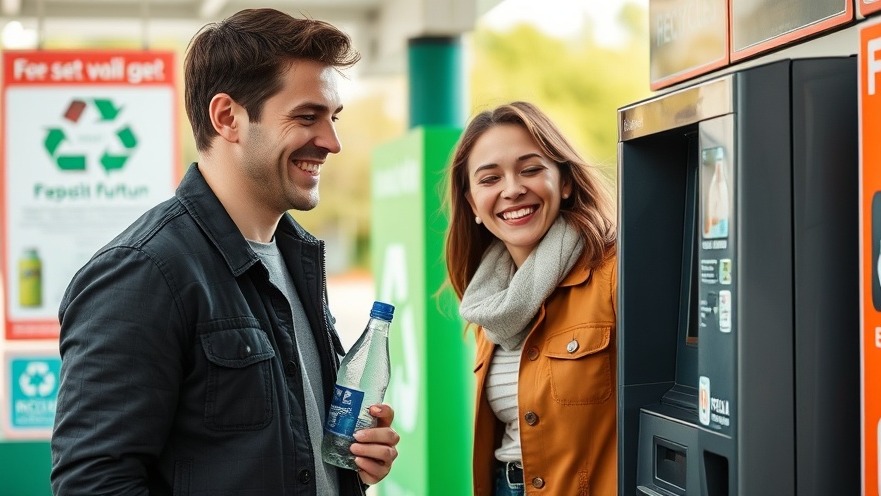
The Rise of Deposit Return Systems: A Smart Move for Sustainability
As we advance into 2025, the conversation about sustainability becomes increasingly intertwined with practical solutions that can benefit both our planet and our wallets. One such solution is the Deposit Return System (DRS), also referred to as bottle bills. These systems have been proven effective in boosting recycling rates, with countries adopting DRS seeing collection rates soar to between 80% and 95%. This remarkable impact raises the question: what constitutes a successful DRS, and how can it benefit not just the environment, but also businesses and consumers alike?
What Makes Deposit Return Systems Effective?
At their core, DRS work by incentivizing consumers to return their beverage containers in exchange for a small deposit, typically around 10 cents. This encourages recycling and, as a result, leads to reduced waste in landfills. Research from Reloop underscores how effective DRS can be, claiming that well-implemented systems can mitigate associated costs through the revenue generated from recycling and unclaimed deposits.
In the United States, only ten states currently utilize DRS, including California and Michigan, which have seen benefits from these programs. For example, California recently expanded its DRS to include wine and spirits bottles, potentially collecting an additional half billion containers annually. With only a fraction of beverage containers being recycled nationwide—around 28.6% for PET bottles—the potential for improvement is massive.
Combining Forces: Extended Producer Responsibility
One compelling advantage of implementing DRS is its synergy with Extended Producer Responsibility (EPR) laws. By requiring producers to help fund recycling infrastructure, communities can alleviate some of the financial burdens associated with waste management. This could eventually lead to cost savings reflected in lower taxes or fees for residents while enhancing recycling rates.
Global Trends in Deposit Return Systems
The movement toward DRS is gaining traction worldwide. Leading programs in Germany and Nordic countries have achieved over 90% recycling rates due to their efficient systems. Germany's rigorous approach includes a mandatory deposit that incentivizes consumers to return containers, combined with advanced reverse vending machines that streamline the process. These successful global models serve as benchmarks for other regions considering similar initiatives.
In contrast, countries like the UK have faced challenges in launching their systems due to logistical concerns, postponing their DRS rollout to 2027. Despite setbacks, the global trend toward implementing DRS reflects a growing recognition of its environmental importance.
Embracing DRS Benefits in Boutique Hospitality
For boutique hospitality professionals—small-scale hotel and eco-lodge owners—the adoption of DRS can significantly enhance sustainability efforts. By promoting recycling within their establishments, they not only contribute to environmental initiatives but also attract environmentally-conscious travelers looking for eco-friendly accommodations. Integrating DRS into on-site amenities can transform the guest experience, making it more engaging and participatory.
Breaking Misconceptions: Costs vs. Benefits
While some in the beverage industry worry that DRS will inflate expenses and consumer prices, studies show that the contrary is often true. Well-run DRS programs can cover operational costs through revenue from recycling, counteracting fears of heightened prices. The reality is that effective implementation of DRS can contribute to lower overall costs by reducing litter and the need for waste management in landfills, ultimately benefiting all stakeholders involved.
Looking Ahead: The Future of Deposit Return Systems
The future of DRS is hopeful, particularly as more states and countries look to reduce plastic pollution and boost recycling rates. Market trends lean toward greater support for sustainability and eco-conscious practices among consumers, which is an encouraging sign for bottle bills. As technology advances and awareness grows, DRS has the potential to significantly influence not just policy, but societal behavior towards waste management.
As we celebrate Global Recycling Day and the crucial role of proactive waste management, it's important to recognize that we, as consumers and entrepreneurs, play an integral role in protecting our planet. Engaging with DRS programs can empower us to take responsibility for our consumption patterns while enjoying the immediate benefits of reduced waste and improved recycling.
Next time you enjoy your favorite drink in a bottle or can, think about how that container can contribute to a more sustainable future. The small action of returning containers can create significant ripple effects in community involvement and environmental stewardship.
 Add Row
Add Row  Add
Add 




Write A Comment